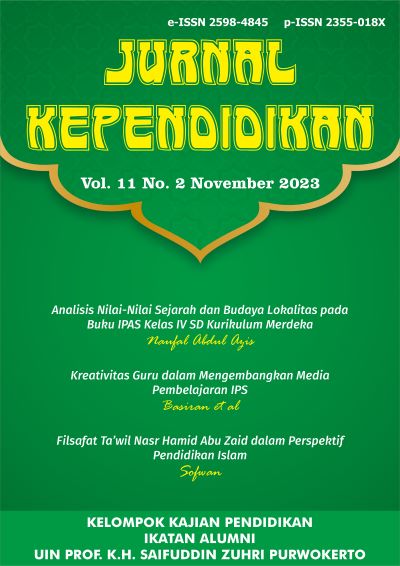Pengaruh Religiusitas dan Pendidikan Karakter Siswa (Disiplin, Jujur, Sopan Santun dan Bertanggung Jawab) Terhadap Agresivitas di MI Istiqlal Jakarta
DOI:
https://doi.org/10.24090/jk.v11i2.9195Keywords:
religiosity, character education, aggressiveness, studentsAbstract
Religiosity is the ability of individuals to understand, live, and apply the values of their religion in everyday life. Character education is the cultivation of ways of thinking and behaving that are characteristic of each individual to live and work together, both within the family and in society. Meanwhile, aggression is an emotional outburst as a reaction to individual failure which is shown in the form of damaging people or objects with an intentional element expressed in words (verbal) and non-verbal behavior. In the research that will be conducted, the researcher will test whether there is an influence of students' religiosity and character education on the level of aggressiveness at MI Istiqlal Jakarta. The method used is quantitative with multiple linear regression analysis, the subject is 165 students of which 69 are male and 96 are female. The sampling technique used is quota sampling by collecting data using a Likert scale with 4 answer choices. The results in the study found that the R square was 0.185, which means 18.5% of the influence of religiosity and character education on aggressiveness. While 81.5% is influenced by other variablesDownloads
References
Ancok, D., & Suroso, F. N. (1994). Psikologi Islami. Yogyakarta: Pustaka Belajar.
Archer, J. (2004). Sex differences in aggression in real-world settings: a meta- analytic review. Review of General Psychology. 8(4). 291–322. doi: 10.1037/1089- 2680.8.4.291
Baron, A. R. & Byrne, D. (2005). Psikologi Sosial Jilid 2 (Ed.3). Jakarta: Penerbit Erlangga.
Bhateri & Singh, R. (2015). A comparative study of aggression between males and females. IOSR Journal of Humanities and Social Science. 20(8). 43-51. doi: 10.9790/0837-20844351
Buss, A.H & Perry, M. (1992). “The Aggression Questionnaire”. Journal of Personality and Social Psychology. The American Psychological Association, Inc.
Campbell, A., & Muncer, S. (1994). Sex differences in aggression: social representation and social roles. British Journal of Social Psychology. 33(2). 233-240. doi: 10.1111/j.2044-8309.1994.tb01021.x
Das, P. P. P., & Tripathy, S. (2015). Role of emotional intelligence on aggression: a comparison between adolescent boys and girls. Psychology and Behavioral Sciences. 4(1). 29-35. doi: 10.11648/j.pbs.20150401.15
DeLisi, M., & Beaver, K. M. (2011). Criminological Theory: A Life-Course Approach. Sudburry, Massachusetts: Jones and Bartlett Publishers
Departemen Pendidikan Nasional. Kamus Besar Bahasa Indonesia Pusat Bahasa Edisi IV. Jakarta: PT Gramedia Pustaka Utama, 2008.
Jalaluddin. (2012). Psikologi Agama. Jakarta: Raja Grafindo Persada.Khan, F. N. (2006). Age differences in expression of aggression in men and women. Journal of Independent Studies and Research. 4(1). 29-32
Margono. (2004). Metodologi Penelitian Pendidikan. Jakarta: PT Rineka Cipta. Madrasah Ibtidaiyah – Madrasah Istiqlal Jakarta (mij.sch.id).diakses pada 29 Mei 2023. Medinnus, G.R., & Johnson, R.C. (1976). Child & Adolescent Psychology, 2nd edition. Canada: John Wiley & Son, Inc.
Mulyasa. (2013). Manajemen Pendidikan Karakter Cetakan 3. Jakarta: PT Bumi Aksara, 2013.
Myers, D. G. (2002). Social Psychology. 7th Edition. McGraw- Hill Companies, Inc.: North America
Purnama, Suci. (2015). Penerapan Pendidikan Karakter Peduli Lingkungan melalui kegiatan OSIS di SMA Negeri 9 Pontianak. Jurnal Untan
Rakhmat, J. (2005). Psikologi Agama Sebuah Pengantar. Bandung: Mizan.
Retno, Listyarti (2012). Pendidikan Karakter dalam Metode Aktif, Inovatif, dan Kreatif. Jakarta: Erlangga.
Sugiyono. (2018). Metode Penelitian Kuantitatif, Kualitatif, dan Kombinasi (Mixed Methods). Bandung: Alfabeta.
Sugiyono. (2019). Statistika untuk Penelitian, Bandung: Alfabet
Suyanto. (2016). Pendidikan Karakter: Konsepsi Dan Implementasinya Secara Terpadu Di Lingkungan Keluarga, Sekolah, Perguruan Tinggi. Yogyakarta: Ar-Ruzz Media.
Thouless. (2008). Pengantar Psikologi Agama. Jakarta: PT. Raja Grafindo.
Downloads
Published
How to Cite
Issue
Section
License
Copyright (c) 2023 Widya Rahmawati Al-Nur, Chintia Viranda, Wiwik Handayani, Fajar Irawan

This work is licensed under a Creative Commons Attribution 4.0 International License.
Authors who publish with this journal agree to the following terms: Authors retain copyright and grant the journal right of first publication with the work simultaneously licensed under a Creative Commons Attribution 4.0 International License that allows others to share the work with an acknowledgment of the work's authorship and initial publication in this journal.













